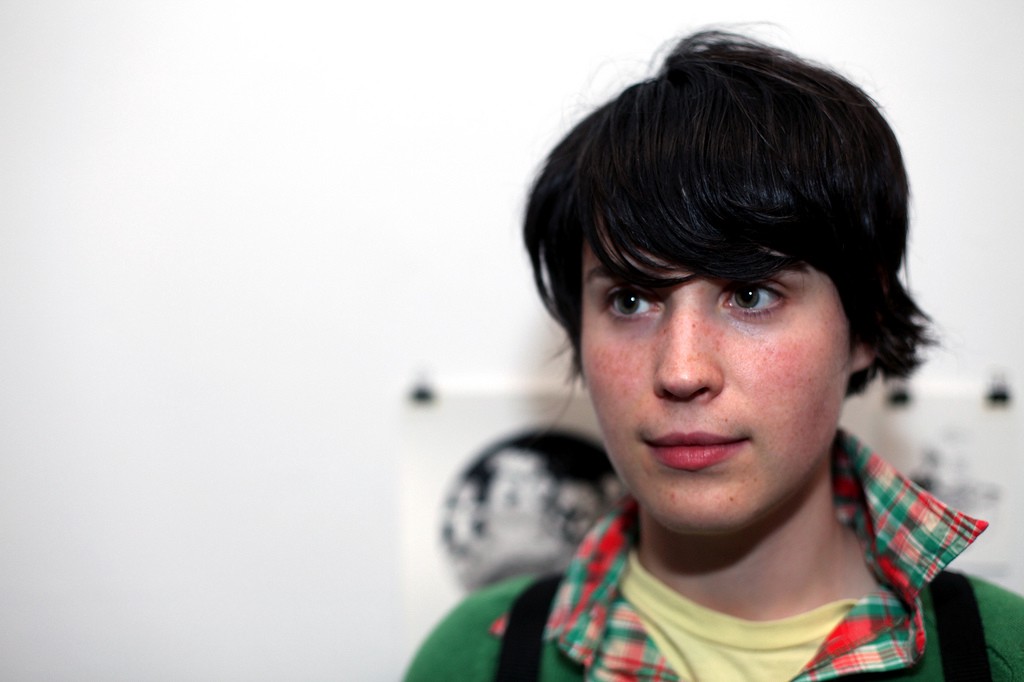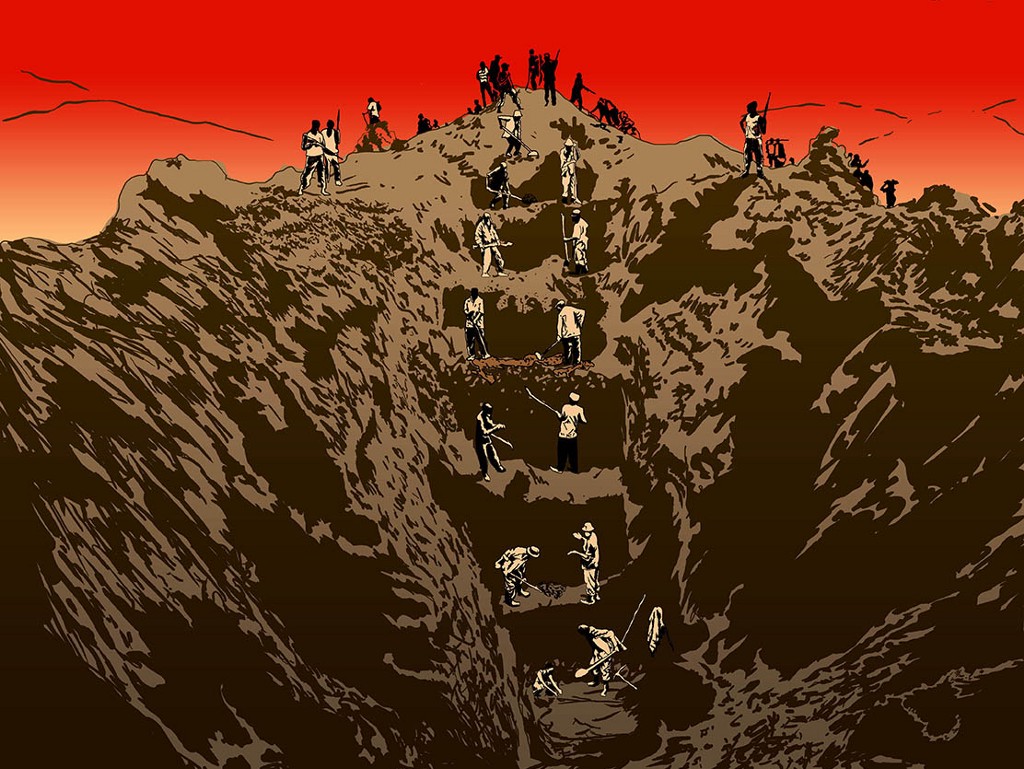okey-panky
Someday Everyone’s Gonna Appreciate What You Are
An interview with cartoonist Alex Citrin

Someday Everyone’s Gonna Appreciate What You Are
A: My mom is so angry at me today.
S: Why?
A: Because I’m not up to date with my thank you notes.
S: You’re a punk.
She was the opposite of me in every way
S: …her name is pronounced not like GEN-uh-vieve, right? It’s Gen-VEE-ev? That’s the right one.
A: Yeah, I always say Gen-VEE-ev.
S: I was reading that Anders Nilsen profile on TCJ and that was the first thing. What other music were you listening to when you first heard her? What was your taste?
A: That was a really big turning point because it was the first time I heard the Microphones, which was what that song was. And that’s the first time I heard her voice —
S: “Solar System.”

A: Yeah. It was this incredible piece of music, and it came to me, but I didn’t know whose voice that was. I had no context for it. It was just this very interesting, beautiful voice. And it wasn’t until two years later that I saw her at a show and I was like THAT’S THE VOICE. Then that led me to Beat Happening, and all that other K Records stuff.
S: When you saw her, that thing where she said to stop smoking. Did you think it was cool that she was in command of her space? She was at work.
A: I thought she was the coolest woman I had ever seen. She was the opposite of me in every way.
Did you want to live in Olympia?
S: When we went to that Calvin Johnson show (in Baltimore in 2013), I don’t think I realized how special that was for you guys… I was just like, yeah, everyone likes Calvin Johnson. But you and Sarah were both like…
A: Yeah! That was really special. The last time I saw him I was photographing him in Montauk, and we stayed in a hotel with him and his mom.
S: How old were you?
A: I was 23.
S: Did you guys bond?
A: I was too nervous.
S: Did you want to live in Olympia?
A: Yes. My dad still makes fun of me because I always said I was going to move to Olympia after college. He was like, why.
S: In your imagination, what did you think it would be like to live there, at that time?
A: I think my idea of what it would be like… I think it was not that dissimilar from what it would actually be like, but I would be removing the actuality of who I am and the things that I need.
S: Was living in Baltimore more like what you imagined Olympia would be?
A: Yes, it was this level of more focused community… it was hard to leave. You put down roots. It takes two years.
S: It takes exactly two years.
Prisoners from the white-collar prison
A: …so once I found out who this woman was, I started listening to her. She became a star in the constellation of music I was into. And then the radio show…I didn’t know who was listening. It was almost this illusion of being able to share these things with people outside of my…actually people did listen to my show. There was one dude who I used to go to high school with who went to another school in the area, and he used to call in sometimes…
S: Was it a call-in show?
A: Not really. I told people to call in and they would sometimes. Prisoners from the white-collar prison…
S: Really?
A: Yeah. They used to call in and say that it sounded like I had a nice face.
S: Ew. There’s something grisly about that.
A: Or that the receiver wasn’t working, because I played all this lo-fi music and it sounded crappy and they were like, the receiver’s fucked up.
But the illusion of sharing things with people, especially since I felt so isolated all the time. That was important. Even though I wasn’t isolated, really. I was living with a bunch of friends. But all of this stuff happened while I was alone. I was in my bedroom. My friends didn’t know I wasn’t going to class, or sleeping fifteen hours a day. They didn’t know everything wasn’t fine, because I’d go to parties. And I never missed a radio show.
Everyone doing it together
S: Did you know about her visual artwork by the time you saw her play?
A: No. It all just kind of unfolded over the course of many years. I mean, relative to the fact that all this information was readily available online. I just never looked into it.
I had those two albums — the well-known one, Alone in the Forest, and then something she did with The Watery Graves.

But the way I absorbed music at that time…maybe we’re the last generation to even think about this. I personally didn’t do a lot of thinking about the lives of the musicians who were making what I was listening to. Any information I found out about them was just by happenstance.
S: Did you read music magazines?
A: Not really. I would listen obsessively, but I think on some level I thought I was the only one listening.
S: Maybe on the east coast at that time you could probably get away with preserving that feeling of privacy. I guess that would be in opposition to how it would be if you were on the ground in Olympia, having it be purposefully communal, everyone doing it together.
A: I was in suburban Connecticut. Dave Matthews land. For us, I mean, getting stuff. The internet was there, but it wasn’t like —
S: I just watched what my friends’ older siblings listened to and they gave us cool stuff.
A: I had camp counselors who turned me on to The Softies…and, like, Wilco.
S: Camp counselors! Were any of them riot grrls?
A: They were men. They were all dudes. Big brother types. They were like, here. Check out Wilco.
S: Oh!
Someday, everyone’s gonna appreciate what you are
A: I was into it. I just wanted to share. I think it [having a radio show] came from not having anyone to share that stuff with in high school. No one would listen to the Softies with me.
S: Did you make mix CDs for them?
A: All the time! I tried. There was this kid I had a crush on who was really into the band Brand New. And I was like, okay, how do we turn this into Black Flag, slowly spoonfeed…so I was like, okay, here, I’m gonna change your life. And then we can get married and go to NYU together.
S: Did you ever read the Jessica Hopper book? There’s this one story about when she was a young teenager, and she liked this guy, so she bought a Soundgarden t-shirt and wore it to the party, trying to get this guy’s attention by pretending to like Soundgarden. But in your case, you were the opposite. You were trying to fix him. You’re like wrong wrong wrong.
A: In the yearbook he wrote to me, he was like, someday everyone’s gonna appreciate what you are.









